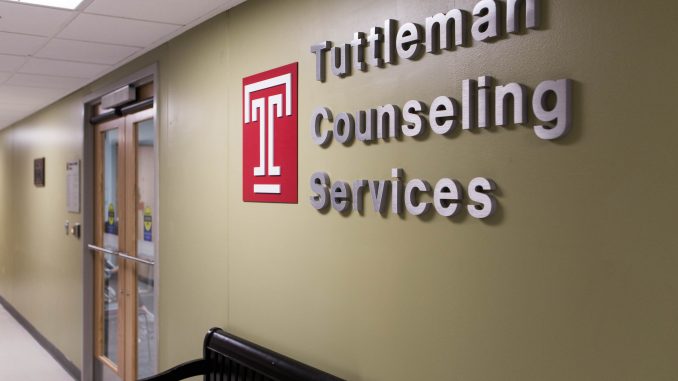
Tuttleman Counseling Services’ relocation at the beginning of Fall 2017 has caused wait times to see a specialist to decrease, but some students are still unable to receive services during the clinic’s walk-in hours.
Tuttleman relocated from 1810 Liacouras Walk to a larger office space on the second floor of 1700 N. Broad St. Because of this move, Tuttleman has 50 percent more floor space and more opportunities for the use of new counseling techniques.
These techniques include the use of biofeedback devices, which uses electronic sensors to allow patients to learn to control their bodies, and bright-light therapy, a technique that exposes patients to bright light to treat different mental illnesses, said John DiMino, the director of Tuttleman.
“We have more potential and more room spaces,” DiMino added. “We have room to grow.”
The wait times have shortened since last year, dropping from an average four-and-a-half week wait to about a three-week period before students can receive treatment, DiMino said.
Tuttleman reaches capacity after 35 students come in during walk-in hours for their in-take examination, during which students complete paperwork about their health history, DiMino added.
Between Sept. 1 and Oct. 17, 761 students came into the walk-in clinic. There were 764 students in 2016 in the same time period.
Due to the high volume of students seeking walk-in appointments each day, there have been some cases of students being turned away because the office was at full capacity, DiMino said.
Between Sept. 1 and Oct. 17, 66 out of 761 students were asked to return another day for services.
This happened on 12 of the office’s first 39 days since TCS opened for service.
“The people who seem more urgent are seen more quickly,” DiMino said.
761
students visited Tuttleman Counseling Services between Sept. 1 and Oct. 17.
66
students were asked to return another day
Once the office establishes that a situation is an emergency with a student in crisis, the patient will be met with a counselor immediately.
DiMino said there has been an increase in students using the counseling services every year, but it’s not specific to Temple — it’s been happening all over the country, possibly due to the increasing awareness of mental illness around the United States, he said.
Rachel Ore, a junior psychology major, went to Tuttleman last year during walk-in hours for her anxiety. After waiting an hour, she was told the clinic was at capacity and was recommended a list of counselors around the Philadelphia area instead.
Because of this instance, she was never seen by a counselor at Tuttleman or elsewhere due to insurance reasons.
“It would have been nice to have some support during that time,” Ore said.
Jessica Pingor, a freshman psychology major, has had a good experience with the new office. After her initial intake examination, she said she was assigned a counselor within a few days.
Tuttleman is staffed by eight full-time employees and a few part-time employees, but the move also allowed more staff members to be hired. Two full-time counselors were added and one part-time position was promoted to a full-time one. Tuttleman now has one new part-time and three full-time psychiatrists.
“We were able to add a couple of counselors this year because we moved to a bigger space,” DiMino said.
With the recent deaths of three Temple students — these include junior film and media arts major Jenna Burleigh, who was killed off-campus, freshman mechanical engineering major Richard Dalcourt, who died by suicide outside 1940 Residence Hall, and political science major Cariann Hithon, who was killed by police in Miami Beach, Florida — some students have come to Tuttleman to express how deaths of their peers have affected them.
However, DiMino said that these deaths did not contribute to the high volume of students who needed counseling.
Tuttleman’s walk-in hours are 10:00 a.m. to 1:30 p.m. on Monday, Tuesday, Thursday and Friday and 9:00 a.m. to noon on Wednesday and Saturday.


Be the first to comment